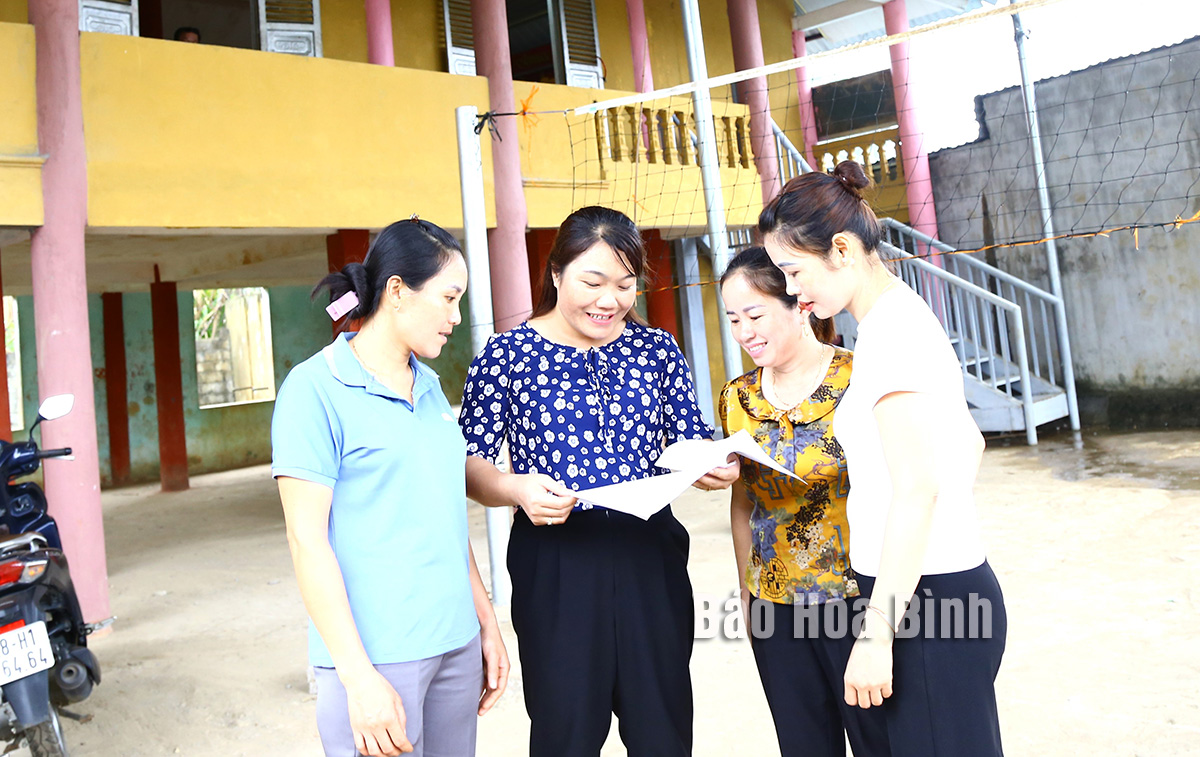
Late Party General Secretary Nguyen Phu Trong’s view on culture has served as the lodestar and a source of encouragement for Hoa Binh in cultural development.
Many cultural
houses have been completed and put into operation in Hoa Binh. In photo: The
cultural house of Doi hamlet in Tay Phong commune, Cao Phong district.
Hoa Binh is home to the six ethnic groups of Muong, Dao, Tay, Thai, Kinh, and
Mong, with the Muong accounting for more than 64% of the local population. Each
of the groups has its own cultural traits, contributing to the province’s
unique cultural tapestry. Over the past years, the province has continued allocating resources to
cultural development.
Cultural preservation, promotion – a key
task
The resolution adopted at 17th provincial Party Congress sets the task of
preserving and promoting the unique culture of ethnic minority groups in tandem
with tourism development, and seeking the dossier of Mo Muong to be included in
the UNESCO List of Intangible Cultural Heritage in Need of Urgent Safeguarding.
Quach Thi Kieu, Director of the provincial Department of Culture, Sports and
Tourism, said local cultural values and heritage have been both preserved and
nurtured.
Numerous cultural activities have been scaled up, generating new products and
values in service of local residents and visitors alike.
Notably, in 2023, the province launched a project aimed at preserving and
promoting the cultural values of the Muong ethnic group and the Hoa Binh
civilisation for the 2023-2030 period. With a total funding of over 500 billion
VND (201,249 USD), this initiative provides significant resources to advance
the cultural sector.
joining hands in cultural development
Following the direction of the Standing Board of the provincial Party
Committee, various departments, agencies, and localities in Hoa Binh have
focused on cultural development.
Despite a host of challenges, Tinh villagers in Tu Ly commune, the mountainous
district of Da Bac, have joined hands in building a cultural house, and
supported the locality’s cultural development policy.
Dinh Van Khuyen’s family has donated hundreds of square metres of land for the
construction of the cultural house. Inspired by his family, many others have
also donated land, workdays, and materials to the project.
A gateway to Hanoi, Luong Son district stands out for its efforts in mobilising
the engagement of different economic sectors in cultural development, turning
itself into a fourth-tier urban area.
Nguyen Duc Dung, Secretary of the district Party Committee, noted that in
recent years, the locality has intensified the movement "All people stay united
to build new-style rural areas and civilised urban areas”.
Vo Ngoc Kien, head of the provincial Party Committee's Information and
Education Board, said such efforts have help create resources for cultural
activities and raise public awareness of the cultural development in the
locality.
With an increasingly vibrant and widespread emulation movement aimed at building cultured residential areas and cultured families, Yen Thuy District has been making steady progress toward improving both the material and spiritual well-being of its people, while fostering a civilized, prosperous, beautiful, and progressive community.
Once lacking recreational spaces and community facilities, Residential Group 2 in Quynh Lam Ward (Hoa Binh City) has recently received attention for the construction of a new, spacious, and fully equipped cultural house. The project followed the model of state support combined with public contributions in both labor and funding.
The "All people unite to build cultural life" movement, which has been effectively integrated with Kim Boi district’s socio-economic development goals, is fostering a lively spirit of emulation across local residential areas, hamlets, villages, public agencies, and enterprises. In addition, through the initiative, traditional cultural values are being preserved and promoted, while community solidarity and mutual support in poverty reduction and economic development are being strengthened.
A working delegation of the Hoa Binh provincial People’s Committee led by its Permanent Vice Chairman Nguyen Van Toan on June 11 inspected the progress of a project to build the Mo Muong Cultural Heritage Conservation Space linked to tourism services in Hop Phong commune, Cao Phong district.
Born and growing in the heroic land of Muong Dong, Dinh Thi Kieu Dung, a resident in Bo town of Kim Boi district, in her childhood was nurtured by the sweet lullabies of her grandmother and mother. These melodies deeply imprinted on her soul, becoming an inseparable part of her love for her ethnic group's culture. For over 20 years, this love for her hometown has driven Dung to research, collect, and pass down the cultural values of the Muong people to future generations.
In the final days of May, the Ethnic Art Troupe of Hoa Binh Province organized performances to serve the people in remote, mountainous, and particularly disadvantaged areas within the province. These were not just ordinary artistic shows, but they were the meaningful journeys aimed at spreading cultural values, enhancing the spiritual life of the people and contributing to the preservation of ethnic minority cultural identities.



